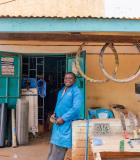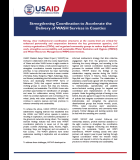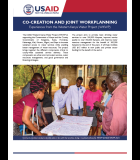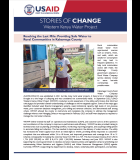Sustainable Water and Sanitation in Africa Project – Kenya (SUWASA-Kenya)
Sustainable Water and Sanitation in Africa (SUWASA) is a regional initiative of the US Agency for International Development (USAID), implemented by Tetra Tech, with a mission of fostering the transformation of water and sanitation delivery services in Africa to achieve long-term financial sustainability through the application of market-based principles. SUWASA is designed to spread effective models of reform at the water utility and sector levels, and to facilitate innovative financing approaches for African water providers.
The program is building partnerships with utilities and small service providers, governments, donors, communities and businesses to demonstrate and promote best practices both for water service reform and governance, as well as innovative financing strategies. SUWASA puts special consideration on improving and expanding the delivery of water and sanitation services in urban and peri-urban settings, with a focus on meeting the needs of the poor. Working through local partners and networks, the program supports countries committed to reform initiatives with technical assistance and capacity building, supplemented with limited financial support for infrastructure as required.
Activity Description
In Kenya, SUWASA worked closely with eight water service providers (WSPs) to develop bankable investment proposals for financing projects valued at approximately $4.6 million, of which $3.4 million resulted in commercial bank loans. SUWASA also partnered with the Government of Kenya’s Water and Sanitation Trust Fund (WSTF) to facilitate and accelerate commercial financing approaches for water infrastructure based on the use of ResultsBased Aid (RBA) and Aid on Delivery. It also worked with three commercial banks (Family Bank, K-Rep Bank, and KCB) to develop tailored products for lending to WSPs for development of water supply infrastructure. It developed communications products and guidelines for both utilities and commercial banks related to commercial financing opportunities for the urban water sector. Lastly, SUWASA developed a gender mainstreaming strategy for water utilities that can serve as a model for utilities in other countries in SSA.
Expected Outcomes
• Assist in establishing innovative mechanisms to finance capital investments
• Support strategies to improving access of slums and peri-urban areas
• Strengthen regulatory agencies and programs
• Assist ministries and utilities in implementing innovative formal agreements to improve accountability for water and sanitation services
• Provide support to sector-level reforms to increase autonomy, accountability, and customer orientation of utilities Challenge
Actual Outcomes
• Based on the commercial financing received by WSPs, 38,231 people gained first-time access to an improved drinking water source, and 62,418 people received improved service quality from existing improved drinking water sources.
• Piloted commercial financing model to support house connections for low-income residents in Kisumu resulting in 1,557 households receiving a connection via loans; and successfully piloted the pre-paid meter model of water service provision for low-income areas of Nakuru






